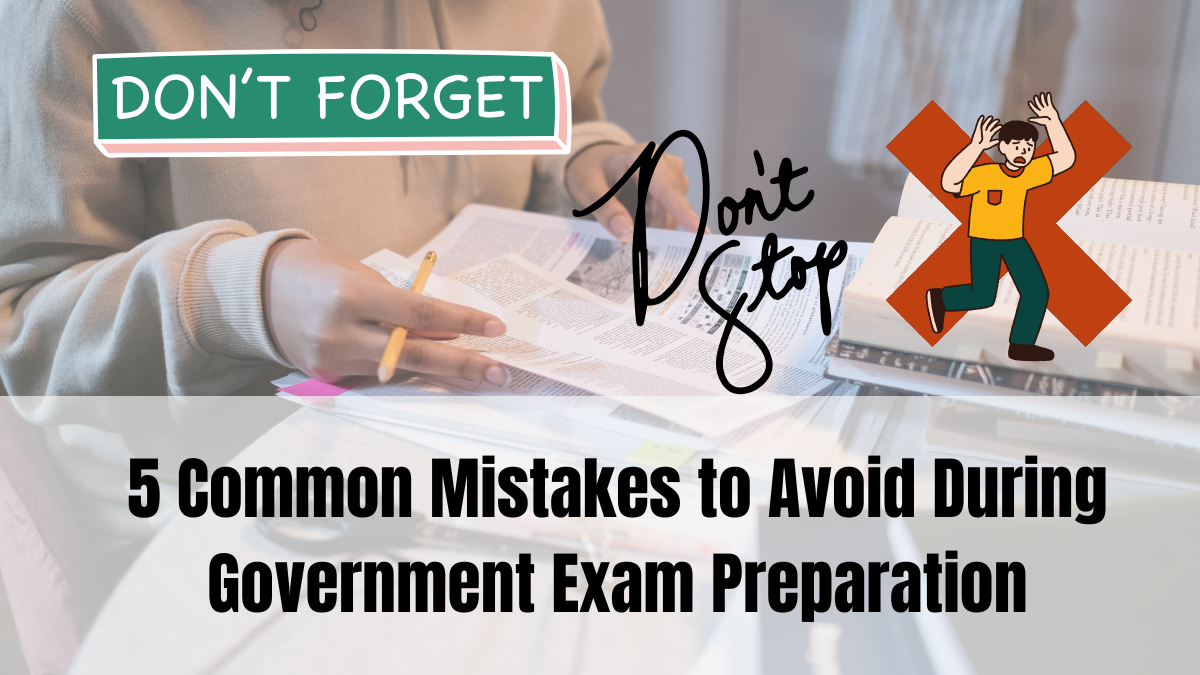Success in competitive exams like SSC, UPSC, Banking, and State PSCs not only depends on what you do right—but also on what you avoid doing wrong. Many sincere aspirants fail not because they lack knowledge or effort, but because they fall into avoidable traps. If you’re targeting success in 2025, staying away from common govt exam errors can give you a real edge.
In this article, we break down the most frequent mistakes made by aspirants and how to steer clear of them with smart strategies and better awareness.

Table of Contents
1. Ignoring the Syllabus & Exam Pattern

Many aspirants start their preparation without even reading the detailed syllabus or understanding the weightage of topics.
-
Without knowing what’s expected, they waste time on irrelevant content.
-
Not studying previous years’ papers leads to blind preparation.
Solution:
Always begin by downloading the latest syllabus and exam pattern from the official website. Stick to it religiously and revise it every month to stay focused.
2. Too Many Resources, Not Enough Depth
A common mistake is using 3–4 books or online courses for the same subject, thinking more equals better.
-
This leads to confusion, repetition, and lack of conceptual clarity.
-
It also eats up revision time and breaks consistency.
Solution:
Choose one trusted source per subject, complete it fully, and revise it often. Toppers always prioritize depth over quantity.
3. Skipping Revision and Mock Tests
Some candidates keep studying new topics until the last minute, ignoring the importance of reinforcement.
-
Without revision, retention drops drastically after a few days.
-
Skipping mocks means no exam-day practice, which affects accuracy and time management.
Solution:
Create a fixed weekly revision plan and give one mock test every week, increasing the frequency as the exam approaches.
4. Ignoring Current Affairs
In exams like UPSC, Banking, and State-level PCS, a big chunk of marks comes from General Awareness and Current Affairs.
-
Many aspirants neglect this and focus only on static subjects.
-
Relying on last-minute compilations doesn’t help build real awareness.
Solution:
Read daily current affairs from a reliable source (like PIB, The Hindu, or online monthly compilations), and revise monthly.
5. Not Having a Study Plan
Studying without a routine is like driving without a map—you might be moving, but not in the right direction.
-
It leads to burnout, inconsistency, and poor coverage of the syllabus.
-
Lack of planning often causes aspirants to miss key topics or spend too much time on less important ones.
Solution:
Create a realistic daily study plan with clear goals, breaks, revision slots, and mock test days. It keeps you accountable and motivated.
FAQs
Why is it important to follow a study plan?
A study plan ensures consistent progress, proper syllabus coverage, and reduced stress. It helps you stay focused and measure your daily efforts effectively.
Is it okay to use multiple sources for one subject?
No. It leads to confusion and shallow learning. Stick to one good source, understand it deeply, and revise it multiple times.
How often should I give mock tests?
Start with one mock test per week and gradually increase to 2–3 per week closer to the exam. Analyze your mistakes to improve with each test.
Can I skip current affairs if I’m strong in other subjects?
No. Current affairs carry significant weightage, especially in UPSC, Banking, and State PCS exams. Skipping it can cost you your selection.
What’s the biggest mistake first-time aspirants make?
The biggest mistake is starting preparation without understanding the exam pattern, syllabus, and previous year trends. Smart planning is as important as hard work.
Click here to know more.






